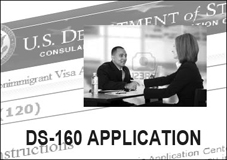US Visa Application Denial: How to Appeal the Decision as a Toronto ResidentIntroduction:Applying for a US visa as a resident of Toronto brings a mix of excitement and challenges. However, encountering a visa application denial can be disheartening. The good news is that there are options available to appeal the decision and present your case for reconsideration. In this comprehensive guide, I will provide valuable insights and practical advice on how to navigate the process of appealing a US visa application denial as a Toronto resident. By following these steps and taking the necessary actions, you can increase your chances of overturning the decision and achieving your visa goals. 1. Understand the Denial Reason: Decode the DecisionTo effectively appeal a visa application denial, it's crucial to understand the reason behind it. Carefully review the denial letter provided by the US embassy or consulate. This letter will outline the specific grounds for denial, such as documentation inadequacies or concerns about ties to your home country. Understanding the denial reason is essential as it helps you address the specific issues in your appeal. 2. Review the Appeal Options: Know Your RecourseAs a Toronto resident, you have the right to appeal a visa application denial. Familiarize yourself with the available appeal options, which may vary depending on the visa category and processing consulate. Typically, you can submit a formal appeal or request a review of the decision. Pay close attention to the designated timeframe for filing an appeal, as missing the deadline can harm your chances of success. 3. Gather Additional Evidence: Strengthen Your CaseTo support your appeal, gather additional evidence that directly addresses the concerns raised in the denial letter. For instance, if the denial was due to documentation insufficiency, provide any missing or updated documents that bolster your eligibility. If the concern was regarding ties to your home country, gather evidence demonstrating your strong connections, such as employment contracts or property ownership documents. The key is to provide compelling evidence that directly addresses the concerns outlined in the denial letter. 4. Consult an Immigration Attorney: Seek Expert AdviceNavigating the appeals process can be intricate, particularly if you are not familiar with immigration law. Consider seeking guidance from an immigration attorney experienced in US visas. who can offer invaluable insights and support in . An attorney will review your case, help you prepare a strong appeal, and ensure all necessary documentation and legal arguments are included. They will also provide advice on the best strategies to present your case effectively. 5. Craft a Persuasive Appeal Letter: Tell Your StoryWhen preparing your appeal letter, take the opportunity to tell your story and explain why the denial decision should be reconsidered. Be clear, concise, and persuasive in your writing. Address the specific grounds for denial and provide a detailed explanation of how you have overcome the concerns raised. Highlight any new evidence or changes in your circumstances that strengthen your case. Express your genuine intentions and emphasize your ties to your home country to alleviate any concerns about potential overstays. 6. Submit the Appeal: Follow the ProcedureCarefully follow the instructions provided by the US embassy or consulate on how to submit your appeal. Adhere to any specific requirements regarding format, documentation, or supporting materials. Ensure that your appeal is submitted within the designated timeframe, as late submissions may not be considered. Keep copies of all documents and communications related to your appeal for future reference. 7. Remain Patient and Positive: Await the OutcomeAfter submitting your appeal, it's essential to remain patient. The appeals process takes time, and it's important to manage your expectations accordingly. While waiting for a response, focus on personal growth, professional development, or alternative opportunities that align with your goals. Maintain a positive mindset and continue planning for your future, regardless of the outcome of the appeal. 8. Follow-Up and Seek Updates: Stay InformedWhile waiting for a decision on your appeal, it's advisable to periodically follow up with the US embassy or consulate handling your case. Politely inquire about the status of your appeal and request any updates or additional information they may need. Staying proactive and demonstrating continued interest in resolving the matter can show your dedication and commitment. 9. Consider Alternative Options: Explore Different PathsIf your appeal is unsuccessful, don't lose hope. There may be alternative paths to achieve your goals of visiting or residing in the United States. Consult with an immigration attorney to explore different visa categories, eligibility requirements, or potential waivers or exemptions. They can provide tailored advice based on your specific circumstances and guide you toward the best course of action. 10. Learn from the Experience: Prepare for Future ApplicationsRegardless of the appeal outcome, view the process as a learning experience. Reflect on the reasons for the denial, the strengths and weaknesses of your appeal, and any feedback provided by immigration authorities. Use this knowledge to better prepare for future US visa applications. Address any identified deficiencies, gather stronger evidence, and refine your strategy based on the lessons learned. Conclusion:Experiencing a visa application denial as a Toronto resident can be discouraging, but remember that you have options to appeal the decision. By understanding the denial reason, gathering additional evidence, seeking professional advice, and submitting a well-crafted appeal, you can increase your chances of overturning the decision and achieving your visa goals. Stay patient, positive, and proactive throughout the process. Embrace every setback as an opportunity for growth and improvement. With determination, resilience, and the right approach, you can navigate the appeals process and set yourself on the path to success in obtaining a US visa. To find out all options on how to get visas you may be interested in reading the following informational materials: 1. A comprehensive guide to the various US visa categories2. Comprehensive guide to scheduling a US visa appointment in Canada 3. Understanding the Visa Application Fee Structure in the US: A Step-by-Step Breakdown 4. Unlocking the Secret: Alternative Ways to Secure a Visa Appointment 5. Mastering the Maze: Unraveling the Top Reasons for US Visa Application Denials for Toronto Residents 6. Overcoming Hurdles: Navigating the Impact of Previous Visa Application Denials on Future Applications
|
||||||||||
Who needs a visa to US? Are you visa exempt? Fastest way to get your visa Did you make travel reservations yet? FAQ Terms and Conditions |
||||||||||



